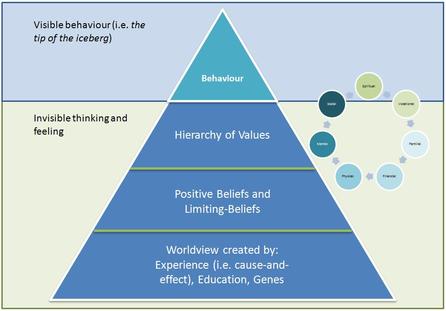
Many people ask me how they can more effectively stay focused on their goals. It is possible that my answer to their question could also serve you. So I'd like to share with you some of my insights into human behavior and some of my reasons why you will either achieve or not achieve the goals you may set.
You have one or more areas of your life that you value and desire to have more fulfillment in (see post Knowing Yourself - Identify your Hierarchy of Values below). And you desire to fulfill that which is most meaningful, most important in your life. When you are very young that may be fulfilling the mastery of a video game. When you are a teenager, it may be looking as attractive as you can because you want to get attention. In your 20's it may be your relationships, in your 30s your job or a career and in your 40s vitality and wealth.
You and everyone else have voids that want to be filled. The word 'fulfillment' means to filling full the mind that is perceiving this void. So anything that you think is not filled, or that you perceive is incomplete or not whole, you want to fill. If you don't have money, you search for money. If you don't have a relationship, you search for a relationship. Whatever it is you are looking for, whatever you think is missing most; you are unconsciously or consciously moving towards and taking actions towards and making decisions to get your void filled. Your fulfillment in life is directly proportionate to how well you fulfill your voids and values. If you feel you are, you feel grateful for life. If you feel you are not, you feel ungrateful.
Any time you minimize yourself and subordinate yourself to other people, you will tend to inject their set of values into your life and take them on as if they were your own values. You will then in turn sacrifice what is truly important to you according to your own higher values and attempt to be somebody you are not. Your true higher values then go unconscious and the injected 'new' values that you will now try to live by become your conscious values. Whenever there is a conflict between the conscious and the unconscious, the unconscious wins which means that although consciously you think your values are x, you still live according to your true unconscious values because that is what determines how you see the world, make decisions in the world and act upon the world (see post Knowing Yourself - Valuing Yourself, Improve your Self-Worth below). So you now end up with a moral dilemma with an internal conflict striving to be the way you think you are supposed to be but still making decisions and living according to your own higher values. Then you wonder why it is that you can't stay focused on the things you think you are supposed to be doing and you will hear yourself saying "I should do this", "I ought to be like that", etc.
When you have an expectation to fulfill an outcome that doesn't match your true higher values, you will end up with anger, aggression, blame, feelings of betrayal, criticism and challenge towards yourself. These ABC's of negativity towards yourself occurs when you have unrealistic expectations and you set goals that don't match your true higher values. For example, if you say you want to exercise and you find out that physical empowerment is right at the bottom of your hierarchy of values, then you are basically setting a goal that doesn't match who you are. It is a fantasy and a delusion and it is guaranteed to create a self-sabotaging feeling inside of you because although you will consciously say that you want to exercise, but you will unconsciously keep going back to what is truly more important to you. It is not fun to hear the truth sometimes because you may like the dopamine fix of living in the unrealistic expectation or fantasy.
Every time you set a goal that doesn't match your higher values you will need outside motivation to keep you working towards it. And if you don't have that motivation from the outside you will probably stop doing it and go back to your real true higher values. If you expect yourself to fulfill the goal and you keep not doing it then you are not going to feel great about yourself. You are going to feel like you are not a master of your destiny.
When you think you're a failure, what's actually going on is that you're being tested to see if you're setting goals that are congruent with your higher values. If you're not really committed to a goal due to incongruency your goal and your higher value, you'll let the perception of failure stop you from going forward. Labels called "failure," and for that matter, "success," are nothing but feedback systems to make sure that you're authentic with your objectives and that they're congruent with your highest values. It makes sure that you're not exaggerating or minimizing your goals and that you get clear on your true objectives.
You will most likely achieve your goals once you set goals that are congruent with your true higher values. When you do greater achievement occurs. Nobody has to get you up in the morning to achieve when you do. So take the time to see what is truly highest on your list of values and start setting your goal to match this. When you do you will endure the many pains and pleasures in your pursuit of it because it is something you can't wait to do. And if you can't wait to get up in the morning and achieve your goal, then you won't let any obstacle in the way, stop you from it.
Because you are unique, you are only truly in competition with others when you are not being true to yourself. The moment you are your true self, there will feel as if there is no true competition and you will shine. May you achieve your many goals and dreams!
Be Extraordinary!
Myles
You have one or more areas of your life that you value and desire to have more fulfillment in (see post Knowing Yourself - Identify your Hierarchy of Values below). And you desire to fulfill that which is most meaningful, most important in your life. When you are very young that may be fulfilling the mastery of a video game. When you are a teenager, it may be looking as attractive as you can because you want to get attention. In your 20's it may be your relationships, in your 30s your job or a career and in your 40s vitality and wealth.
You and everyone else have voids that want to be filled. The word 'fulfillment' means to filling full the mind that is perceiving this void. So anything that you think is not filled, or that you perceive is incomplete or not whole, you want to fill. If you don't have money, you search for money. If you don't have a relationship, you search for a relationship. Whatever it is you are looking for, whatever you think is missing most; you are unconsciously or consciously moving towards and taking actions towards and making decisions to get your void filled. Your fulfillment in life is directly proportionate to how well you fulfill your voids and values. If you feel you are, you feel grateful for life. If you feel you are not, you feel ungrateful.
Any time you minimize yourself and subordinate yourself to other people, you will tend to inject their set of values into your life and take them on as if they were your own values. You will then in turn sacrifice what is truly important to you according to your own higher values and attempt to be somebody you are not. Your true higher values then go unconscious and the injected 'new' values that you will now try to live by become your conscious values. Whenever there is a conflict between the conscious and the unconscious, the unconscious wins which means that although consciously you think your values are x, you still live according to your true unconscious values because that is what determines how you see the world, make decisions in the world and act upon the world (see post Knowing Yourself - Valuing Yourself, Improve your Self-Worth below). So you now end up with a moral dilemma with an internal conflict striving to be the way you think you are supposed to be but still making decisions and living according to your own higher values. Then you wonder why it is that you can't stay focused on the things you think you are supposed to be doing and you will hear yourself saying "I should do this", "I ought to be like that", etc.
When you have an expectation to fulfill an outcome that doesn't match your true higher values, you will end up with anger, aggression, blame, feelings of betrayal, criticism and challenge towards yourself. These ABC's of negativity towards yourself occurs when you have unrealistic expectations and you set goals that don't match your true higher values. For example, if you say you want to exercise and you find out that physical empowerment is right at the bottom of your hierarchy of values, then you are basically setting a goal that doesn't match who you are. It is a fantasy and a delusion and it is guaranteed to create a self-sabotaging feeling inside of you because although you will consciously say that you want to exercise, but you will unconsciously keep going back to what is truly more important to you. It is not fun to hear the truth sometimes because you may like the dopamine fix of living in the unrealistic expectation or fantasy.
Every time you set a goal that doesn't match your higher values you will need outside motivation to keep you working towards it. And if you don't have that motivation from the outside you will probably stop doing it and go back to your real true higher values. If you expect yourself to fulfill the goal and you keep not doing it then you are not going to feel great about yourself. You are going to feel like you are not a master of your destiny.
When you think you're a failure, what's actually going on is that you're being tested to see if you're setting goals that are congruent with your higher values. If you're not really committed to a goal due to incongruency your goal and your higher value, you'll let the perception of failure stop you from going forward. Labels called "failure," and for that matter, "success," are nothing but feedback systems to make sure that you're authentic with your objectives and that they're congruent with your highest values. It makes sure that you're not exaggerating or minimizing your goals and that you get clear on your true objectives.
You will most likely achieve your goals once you set goals that are congruent with your true higher values. When you do greater achievement occurs. Nobody has to get you up in the morning to achieve when you do. So take the time to see what is truly highest on your list of values and start setting your goal to match this. When you do you will endure the many pains and pleasures in your pursuit of it because it is something you can't wait to do. And if you can't wait to get up in the morning and achieve your goal, then you won't let any obstacle in the way, stop you from it.
Because you are unique, you are only truly in competition with others when you are not being true to yourself. The moment you are your true self, there will feel as if there is no true competition and you will shine. May you achieve your many goals and dreams!
Be Extraordinary!
Myles



 RSS Feed
RSS Feed